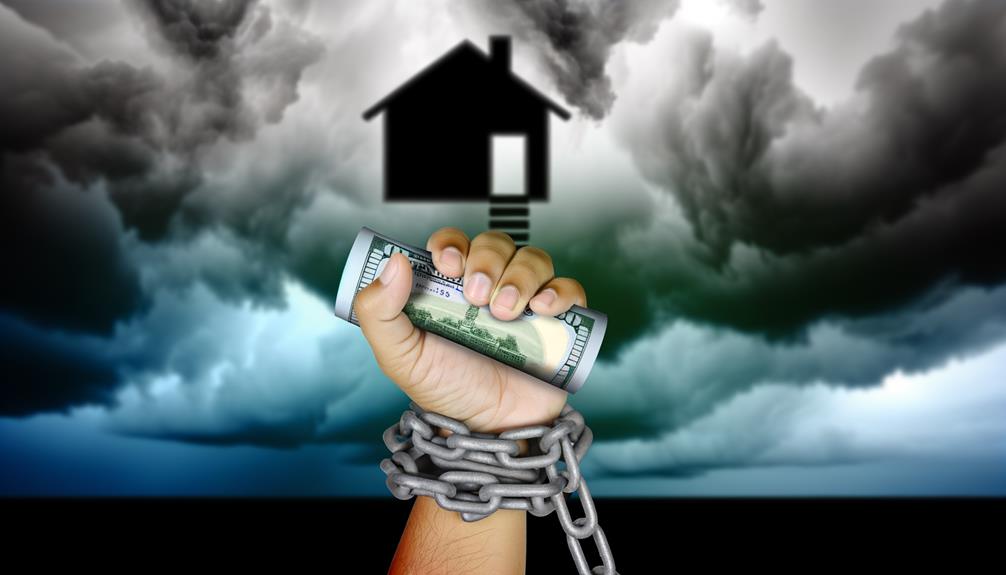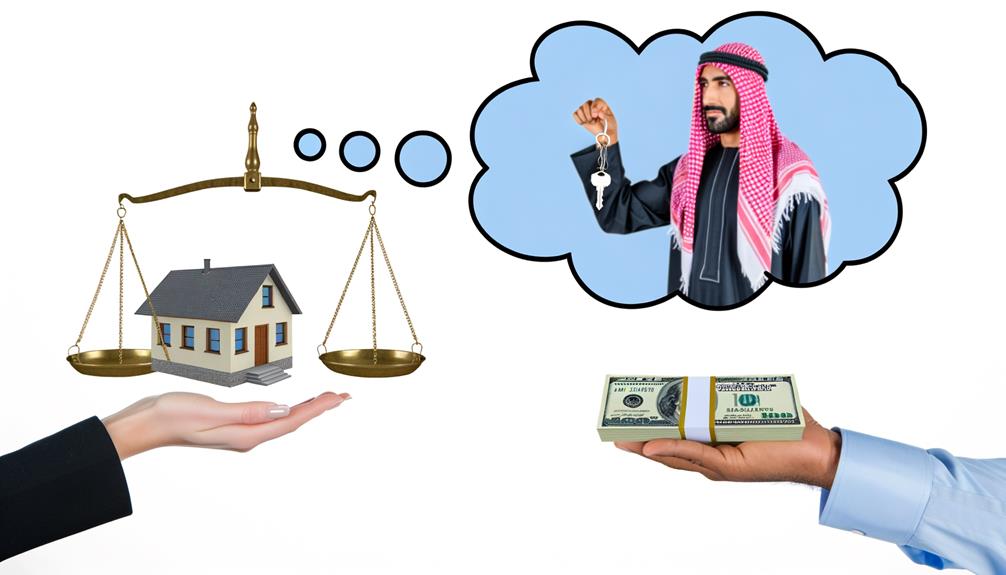The topic of whether paying cash for a house is a good idea or not is a multifaceted one that warrants a detailed exploration. On one hand, it can expedite the buying process, potentially eliminate a slew of additional costs, and provide a sense of financial security.
On the other hand, it may tie up a significant amount of liquidity in a single asset and prevent the buyer from taking advantage of certain tax benefits related to mortgage interest. As we unpack the complexities of this financial decision, we should bear in mind that the right choice is often dependent on individual circumstances, financial standing, and long-term goals.
Let us embark on this enlightening journey of examining the pros and cons of paying cash for a house.
Key Takeaways
- Cash payments for a house offer quick closure and lower closing costs, making it advantageous in competitive markets.
- Cash payments eliminate mortgage payments, interest, and fees, providing financial benefits and expedited closing processes.
- However, cash payments lack liquidity and miss out on tax benefits of mortgage interest deductions, limiting investment opportunities and financial flexibility.
- Choosing between cash and mortgage depends on the buyer's financial situation and goals, considering factors such as credit building, potential tax deductions, long-term financial goals, liquidity, and risk tolerance.
Understanding Cash Home Purchases
Delving into the realm of cash home purchases, it becomes evident that such transactions offer attractive benefits such as quick closure, lower closing costs, and freedom from mortgage payments, all the while demanding a careful consideration of one's financial standing, long-term goals, and risk tolerance.
Cash buyers are often preferred in competitive markets due to the certainty of funds and a faster closing process. Using cash to buy a house eliminates the need for mortgage payments, interest, and associated fees, contributing significantly to financial benefits.
However, when deciding to buy a home with cash, it's crucial to evaluate potential drawbacks. These can include tying up a significant amount of capital and missing out on potential tax benefits of mortgage interest deduction. Therefore, making an all-cash offer is not always the best approach for everyone.
Factors to consider when deciding on a cash home purchase include current financial situation, long-term financial goals, market conditions, and personal risk tolerance. Whether paying cash for a house is a good idea or not largely depends on these factors. Hence, a cash home purchase requires careful planning and assessment.
Advantages of Cash Payments
Transitioning into the advantages of cash payments, it becomes apparent that such a method of purchasing a house offers several compelling benefits, ranging from an expedited and simpler closing process to the absence of mortgage payments and associated costs. This can be a smart financial move in the housing market, imbuing potential homeowners with a sense of security and peace of mind.
Paying cash for a home not only simplifies the closing process but also significantly accelerates it. A faster closing can be achieved, sometimes in just a week or two, which is particularly advantageous in a competitive housing market. This not only ensures you secure the desired property but also reduces the amount of time where the purchase price is exposed to potential market fluctuations.
Furthermore, when you buy a house outright, you eliminate the need for mortgage payments, interest, and other associated fees. This advantage cannot be overstated as it provides a unique financial freedom. The absence of these payments redirects funds to your savings account, securing a more stable economic future. In addition, lower closing costs are another benefit of cash payments, further strengthening your financial position.
Drawbacks of Cash Payments

Despite the apparent advantages, paying cash for a house also presents several potential drawbacks, including a potential lack of liquidity and missed opportunities for mortgage tax deductions and other investments. By doing so, you tie up a significant amount of your money into one asset which can reduce your financial flexibility and limit your access to emergency funds.
In addition, the cons of paying cash for a home also include missing out on potential tax benefits related to mortgage interest deductions if you itemize your deductions. This is a significant aspect of the home buying process as it can save you money in the long term.
Another drawback is the potential loss of investment opportunities. By putting all your cash into a single purchase, your money is not available for other potential investments which could provide higher returns. This lack of diversification could increase your overall portfolio risk.
| Drawbacks | Description | Result |
|---|---|---|
| Lack of liquidity | Tied up cash in home | Reduced financial flexibility |
| Missed tax deductions | No mortgage interest to deduct | Lost financial benefits |
| Lost investment opportunities | Cash tied up in home | Increased portfolio risk |
Cash Versus Mortgage Comparison
How does buying a house with cash compare to obtaining a mortgage? The cash versus mortgage comparison is an essential examination for anyone looking to pay for a home.
When opting for a cash arrangement, buyers can sidestep the traditional home financing arrangement and its accompanying mortgage payment. This route often leads to a simplified and expedited buying process, reducing the waiting period from a few months to potentially a week. Furthermore, buying a home with cash can lower closing costs, providing substantial savings.
Conversely, obtaining a mortgage is a more extended process, with high interest rates and additional costs, but it is a viable option for those unable to qualify for the entirety of the home's price upfront. With this method, buyers can spread the cost over a longer period, making it more manageable.
However, the choice between paying cash and going through the mortgage process has its pros and cons. Cash purchases may be faster and cheaper in the short term, but mortgages can offer benefits like building credit and potential tax deductions. Ultimately, the decision depends on the buyer's financial situation and goals when buying a house.
Final Thoughts on Cash Purchases

Delving into the final thoughts on cash purchases, it becomes evident that these transactions provide immediate ownership and eliminate mortgage obligations, offering a sense of financial stability and potential cost savings over the long run. However, it is equally important to consider the downsides. Substantial cash investments in the real estate market can limit your financial flexibility and hinder the potential for higher returns from diverse portfolios.
Careful consideration of your long-term financial goals, liquidity, and tax implications is crucial when deciding if paying cash for a house is a good idea. Diligent due diligence, including a thorough home inspection, can prevent unforeseen major repairs, further helping you save money.
The table below provides a summary:
| Pros of Cash Purchases | Cons of Cash Purchases |
|---|---|
| Immediate Ownership | Tied Up Cash |
| No Mortgage Obligations | Limited Financial Flexibility |
| Potential Cost Savings | Missed Higher Returns |
| Financial Stability | Diversification Issues |
| Avoids Major Repairs Costs | Risk of Home Prices Drop |
Frequently Asked Questions
Does the IRS Know When You Buy a House Cash?
No, the IRS does not automatically know when you buy a house cash. There are no reporting requirements for such cash transactions. However, home purchase records may be reviewed during audits for tax implications.
Does It Make Sense to Pay Cash for a Home?
Paying cash for a home offers significant advantages such as mortgage avoidance, increased negotiation power, and financial flexibility. However, it may limit liquidity and investment opportunities, and comes with potential cash disadvantages and financing alternatives.
How Much Less Should You Offer on a House When Paying Cash?
Offering less when paying cash for a house depends on cash advantages, negotiation tactics, market influences, seller's perspective, and economic factors. Generally, a 5-10% discount is plausible due to immediate financial stability for the seller.
How Much Cash Should I Have for a House?
Determining cash for a house involves a strategic savings strategy, considering investment options, financial stability, and emergency funds. Typically, a 20% down payment is standard, while maintaining cash reserves for property valuation and housing market fluctuations.
Conclusion
In conclusion, purchasing a house with cash may yield a multitude of benefits, including expedited closing processes, reduced financial burdens, and an enhanced likelihood of securing a desired property.
However, it also presents certain drawbacks, such as potential opportunity costs.
The comparison between cash and mortgage purchases necessitates careful consideration, underlining the importance of comprehensive financial planning.
Therefore, while cash purchases may be beneficial, they are not universally advantageous, emphasizing the need for thorough scrutiny.


